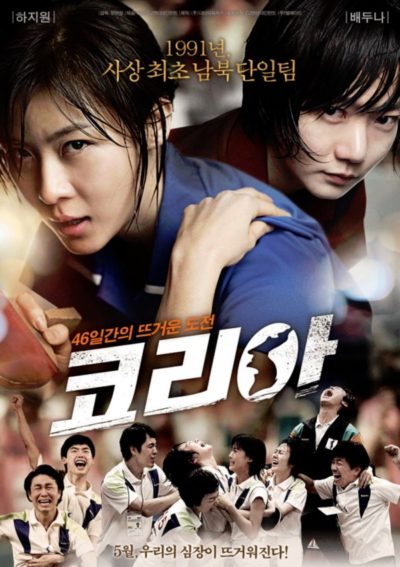★★★
“Ping-pong diplomacy.”
 After the bombing of a South Korean jet by North Korean agents in 1987, relations between the two nations sank to perilously low levels. In an effort to help mend fences, the countries agreed to join forces and send a unified squad to the 1991 World Table Tennis Championship in Japan, to take on the all-powerful Chinese. The process was not without its bumps, as the South’s star player, Hyun Jung-hwa (Ha), and her counterpart in the North, Ri Bun-hui (Bae), struggle to overcome their differences and become a cohesive doubles partnership. Their respective coaches (Park and Kim) also have to learn to navigate shoals both sporting and political on the way to the gold medal match in Tokyo.
After the bombing of a South Korean jet by North Korean agents in 1987, relations between the two nations sank to perilously low levels. In an effort to help mend fences, the countries agreed to join forces and send a unified squad to the 1991 World Table Tennis Championship in Japan, to take on the all-powerful Chinese. The process was not without its bumps, as the South’s star player, Hyun Jung-hwa (Ha), and her counterpart in the North, Ri Bun-hui (Bae), struggle to overcome their differences and become a cohesive doubles partnership. Their respective coaches (Park and Kim) also have to learn to navigate shoals both sporting and political on the way to the gold medal match in Tokyo.
Since this is based on real events, it’s no spoiler (and certainly would not have been for the Korean audience) to say that the unified team triumphs in dramatic fashion. Indeed, the whole thing is more or less an exhibition of Sports Clichés 1 0.1, with moments which you feel have been needlessly juiced up for emotive purposes. For example, did the entire South Korean roster really kneel in the rain outside their hotel, after the North Korean players were withdrawn for breaches of the rules? Did Ri really collapse during the last few minutes of the final, before an inspirational speech from Hyun? I’ve been unable to confirm either incident and it feels like a case of the writers over-egging the pudding, dramatically speaking.
Fortunately, everything else is excellent, and it’s clear a lot of attention went into details, some of which may not be visible to a Western audience e.g. the North Korean players speaking with appropriate dialect and accents. What was impressive even to me, was that the actresses genuinely looked like they were professional table-tennis players. Months of training went into that, with the real Hyun being one of the coaches. Praise in particular to Bae, who had to learn how to play with her left-hand, to match the one used by Ri. Although CGI was used to “fill in” the ball during the actual tournament sequences, there were no doubles used for the actresses, and the results look close to impeccable – as good as any sports movie I’ve seen.
Even away from the table, the performances are good, and if the melodrama is turned up little too high, the balance otherwise is nicely handled, with a mix of humour, human interest and patriotism which is effective. While the Chinese are depicted as the “villains” her – and it’s not exactly subtle! – there is very much a message of how sport can act as a unifying force for a country. That’s something I tend to agree with, which is why I have little time for those who use it in divisive ways, such as kneeling during the anthem. There’s no doubt the intent here is almost nationalistic, yet it still works well enough for non-Koreans – and for those who still call the game ping-pong.
Dir: Moon Hyun-sung
Star: Ha Ji-won, Bae Doona, Park Chul-min, Kim Eung-soo




